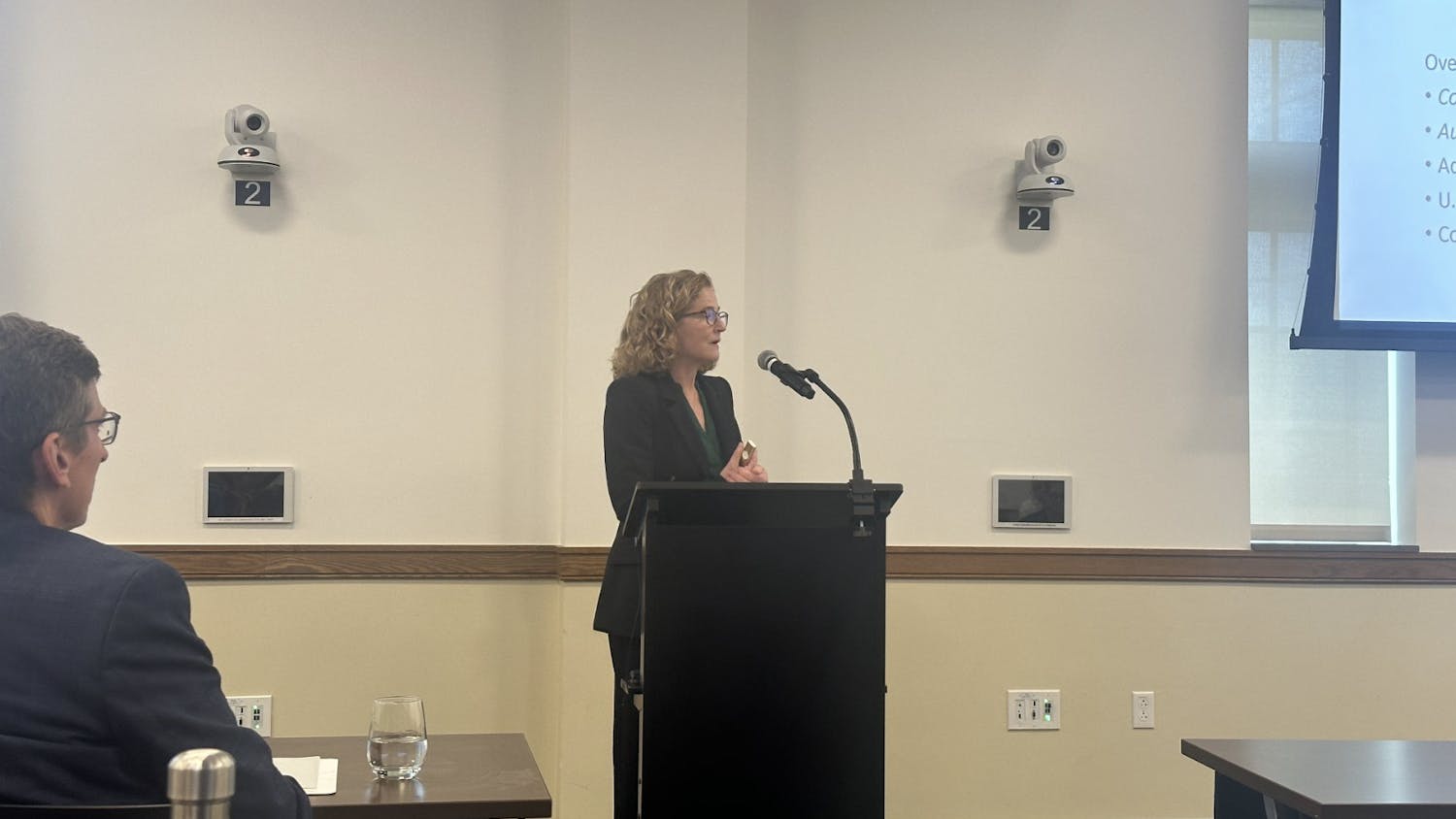The Worker Participation Committee (WPC) presented its new recommendations regarding the manufacturing of Notre Dame licensed products in other countries during a panel discussion in Geddes Hall on Tuesday.
The presentation was primarily conducted by University Executive Vice President John Affleck-Graves and doctoral student in moral theology Craig Iffland. Both panelists outlined five points summarizing the WPC’s recommendations.
“The core issue that the committee grappled with was the concept of can the University be a force for good on the inner factories in causing change at the worker level and influence and bring broader leverage to that by having others with us in the process,” Affleck-Graves said.
The first recommendation, Affleck-Graves said, was to establish a standing committee to monitor the University’s progress.
“I think that there’s a really strong feeling of the committee that this should be a standing committee,” he said. “Several other universities, like Michigan and Wisconsin, and others have standing committees, so the recommendation is that we should have a standing committee and that we should make progress on the recommendations that follow.”
The second point called for the standing committee to broaden the range of human rights issues it reviews.
“While worker participation [is] extremely important ... things like child labor, the environment, health and safety. ... These are also extremely important issues for people working in these factories,” Affleck-Graves said. “[We are recommending] the assessment should be broadened to cover those areas as well, and we did highlight the human rights as required by the licensing code of conduct.”
The third and fourth recommendations focused on assessment and audit processes, depending on whether or not the country recognizes freedom of association by law.
“In countries that recognize the freedom of association, by law, every licensee will be required to participate in the Sumerra assessment process to evaluate the organization’s current corporate responsibility program,” Affleck-Graves said. “So this came about because what we found was it’s very time-consuming and expensive to do these audits.
According to the summary of recommendations released by the WPC, “Sumerra will also conduct an audit of all overseas factories where licensed products are manufactured,” and the proposed standing committee will provide ongoing oversight.
For countries that do not recognize freedom of association by law, the standing committee may consider a limited exemption to manufacture in those countries after the factory completes both the Sumerra assessment and a more in-depth audit by Verité, according to the release.
“The Verité instrument we feel is a very good instrument, it is long, it is complex and it requires an on-site campus visit by Verité, and Verité do not have the capacity to do more than a few factories for us a year,” Affleck-Graves said. “And so there’s this other organization, Sumerra — they do work with many of the major companies and they do routine assessments.”
Countries with freedom of association by law, Affleck-Graves said, would undergo an audit and, based off the WPC’s determinations, may or may not need to undergo Verité depending on if the standing committee thinks there’s reason for a more in-depth view of the potential factory. For countries without freedom of association, Verité would be a requirement.
“The idea right now is that the licensee, if they wanted to apply for an exemption, they would be required to complete everything that every other factory is saying you should complete,” Affleck-Graves said. “Which is one, the pre-survey by Sumerra, two, the Sumerra audit, three, Verité.”
The final recommendation suggested the University work with other organizations to advance “respect for workers’ rights, other human rights and promote corporate responsibility,” the release said.
Iffland said part of building partnerships was planning a consortium with other universities.
“I think the basic idea here is to try to build stronger partnerships with other universities in thinking through how universities can put together their licensees, influence and improve worker conditions, wages, workers rights, at the factory level,” Iffland said. “So, what this is going to look like is not totally foreseeable within the recommendation. I would say that one thing we’d like to do over the next year is have some sort of consortium with other universities as well as Sumerra, to have some sort of broad discussion about corporate responsibility, universities, corporate licensees [and] what they can do to improve working conditions.”
Affleck-Graves said he believes as Notre Dame gains more influence with major manufacturers around the world and within countries through a greater presence, it is easier to bring better working practices to multiple countries and the larger industry.
”I think there is a strong feeling that Notre Dame can be a force for good in the world,” Affleck-Graves said. “And so the question is — where do you do the most good? There are workers in every country, and I would hate to abandon one country just because we favor another country.”
Read More
Trending









